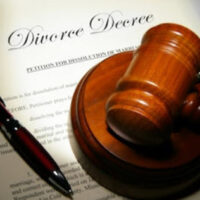Understanding Your Divorce Decree

Whether a divorce took only a few weeks, several months, or even years, most couples breathe a sigh of relief when the process is complete and they have a final decree of divorce in hand. Besides being a symbol of closure and new beginnings, final divorce decrees are also important legal documents that are binding on both parties. Divorce decrees are court orders, so violating that decree in any way is a violation of the law. This means that the party affected by the noncompliance has the right to enforce the decree, while the breaching party could face serious legal repercussions.
Ultimately, the keys to understanding the terms of a decree are knowing what is in the order and how to go about enforcing it. For help gaining a better understanding of your own divorce decree, reach out to a Fort Lauderdale divorce lawyer who can explain the more complicated aspects of the document.
Topics that Will be Covered in a Divorce Decree
Every divorce case is different, so the specific details contained in a court order will vary considerably depending on a family’s circumstances. There are also different ways for divorcing parties to reach the finalization of their divorce, which can affect what is included in their divorce decree. Some couples, for instance, will agree on most or all divorce-related issues and so will be able to negotiate an agreement out of court. In other cases, the parties will require the help of a mediator, or may need to go to court, where a judge will be tasked with resolving disputed issues. There are a few topics, however, that most people can expect to see covered in their divorce decrees, including:
- The identification of both parties’ separate assets and debts;
- The identification of marital property and how it will be distributed between the parties upon divorce;
- Spousal maintenance, if the couple, or a court, determines that a lower earning spouse will face financial challenges without assistance;
- A parenting plan if a couple shares minor children, that will cover custody, visitation, and the division of parental responsibilities;
- Child support, including the amount and duration of payments; and
- A Qualified Domestic Relations Order (QDRO), which dictates how distributions from retirement plans will be made.
For help making sense of these topics in your own divorce decree, please reach out to our office today.
Enforcement Options
Besides the aforementioned topics, divorce decrees will also contain information about enforcement, or what one party can do if the other won’t abide by the terms of the court order. These enforcement actions can allow for:
- The transfer and delivery of assets upon divorce;
- The collection of a money judgment in cases where an asset no longer exists or was significantly depleted;
- The collection of attorneys’ fees; and
- An order of contempt, which could result in a modification of the divorce decree, a fine, and even jail time.
Please call our legal team to learn more about how to go about enforcing your own divorce decree.
Get Legal Help
We can help you set up a consultation where dedicated divorce lawyer Sandra Bonfiglio, P.A. can explain the divorce process and the role and importance of a final divorce decree. For more information, please call 954-945-7591.
Source:
dol.gov/sites/dolgov/files/EBSA/about-ebsa/our-activities/resource-center/faqs/qdro-overview.pdf
